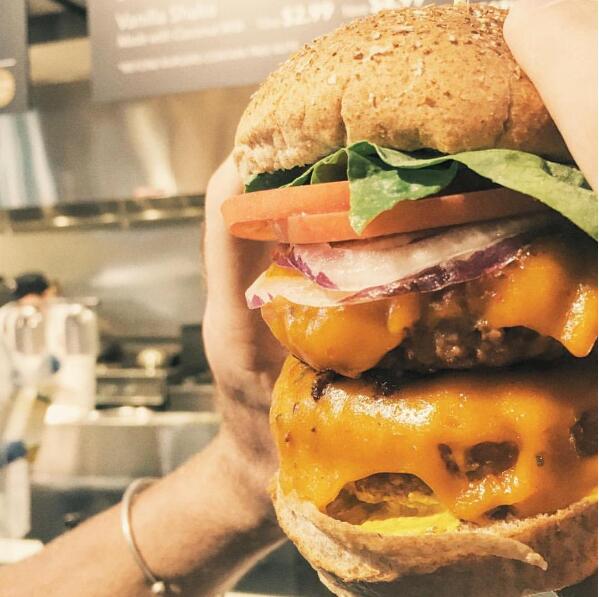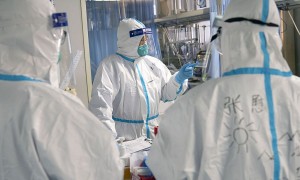导读:世界最大肉制品加工公司之一要进军植物人造肉制品生产啦!

One of the world’s largest meat processing companies is taking a 5-percent ownership stake in a company that produces plant-based faux meat products.
世界最大肉制品加工公司之一购买了一家生产植物人造肉制品公司5%的所有权股份。
Tyson Foods announced Monday that it’s investing in Beyond Meat, a privately held company best known for creating the “Beyond Burger,” a vegan burger that “bleeds” beet juice. The amount Tyson is investing has not been disclosed, The New York Times reports.
泰森食品公司周一宣布将投资“超越肉类”公司,这是一家私营企业,以开发能流出甜菜汁的“超越素食汉堡”而著名。据《纽约时报》报道,泰森公司的投资额尚未披露。
“This investment by Tyson Foods underscores the growing market for plant protein,” said Beyond Meat founder and CEO Ethan Brown in a Tyson press release. “I’m pleased to welcome Tyson as an investor and look forward to leveraging this support to broaden availability of plant protein choices to consumers.”
“泰森食品公司的投资展示了越来越大的植物蛋白市场。”超越肉类公司创始人兼首席执行官伊森·布朗在泰森的新闻发布会上说,“我很高兴地欢迎泰森公司作为投资者加入我们,我们很期待这能够帮助拓展消费者对植物蛋白食品的选择。”
The announcement drove up shares in Tyson Foods on Tuesday, according to The Street.
据《华尔街日报》报道,这项声明周二抬高了泰森食品的股价。
Demand for plant-based meat alternatives is growing worldwide due to a variety of factors, including concerns about animal welfare, desires to eat healthier and increased awareness of industrial animal agriculture’s impacts on the environment and climate. (That said, research suggests that meat consumption is up in the U.S. compared to recent years, largely driven by a surplus of chicken driving poultry prices down.)
世界范围内对植物人造肉的需求越来越大,原因有很多:担心动物福利、为了吃得更健康以及人们越来越关注工业化畜牧业对环境和气候的影响。(这就是说,研究表明,近年来美国肉类消费呈上升趋势,很大程度是因为养鸡业过剩导致的禽类价格下降。)
Tyson’s not the only food giant hoping to cash in on trends spurred by eco-conscious consumers. In May, processed meat leader Hormel Foods Corporation ― which makes Spam ― purchased Justin’s, an organic, vegetarian nut butter company based in Boulder, Colorado.
有生态意识的消费者引领了各种趋势,泰森不是唯一一个往这些趋势投资的食品业巨头。5月份,加工肉制品领域的龙头老大荷美尔食品公司(就是生产世棒午餐肉的那个公司)收购了贾斯汀氏公司——这家公司位于科罗拉多州波尔德,专门生产纯天然有机坚果酱。
And the animal agriculture industry as a whole is feeling growing public pressure to respond to concerns about animal welfare and environmental impact.
而且整个畜牧业也感受到了公众的压力,对动物福利和环境影响做出了回应。
As scientists warn that the overuse of antibiotics in farm animals is creating dangerous “superbugs” — and animal rights advocates say farmers give excess antibiotics to curtail the effects of deplorable living conditions — major poultry producers are increasingly offering antibiotic-free chicken.
科学家警告称,在圈养动物身上滥用抗生素会产生危险的“超级细菌”——而动物权益保护者则表示,农场主使用过量的抗生素会导致动物的生存质量下降——大部分禽类加工商一直在提供不含抗生素的鸡肉。
And an industry group representing 95 percent of egg producers in the U.S. announced in June that it would phase out the gruesome practice of grinding up male chicks alive.
而一个代表了美国95%蛋类提供商的工业团体6月份宣布,将逐步淘汰将雄性小鸡生生碾碎的可怕行为。
That said, many companies face accusations of “greenwashing” as they attempt to appease an animal-loving populace. For instance, more and more major companies are making the switch to “cage-free” eggs, including major restaurant chains like McDonald’s and Taco Bell. But critics point out that the label is no guarantee that the product is cruelty-free, since “cage-free” hens often still live in overcrowded sheds with no access to the outside.
这就是说,为了安抚热爱动物的公众,很多公司都面临着“绿色清洗”的谴责。比如,包括麦当劳和塔科贝尔快餐公司在内,越来越多的大公司正在标榜自己使用的是“非笼养鸡蛋”。但是,有批评声音认为,这个标签无法保证产品的制作过程中没有动物受到虐待,因为“非笼养”的母鸡还是在过于拥挤的鸡群中生活,无法到外面去活动。







